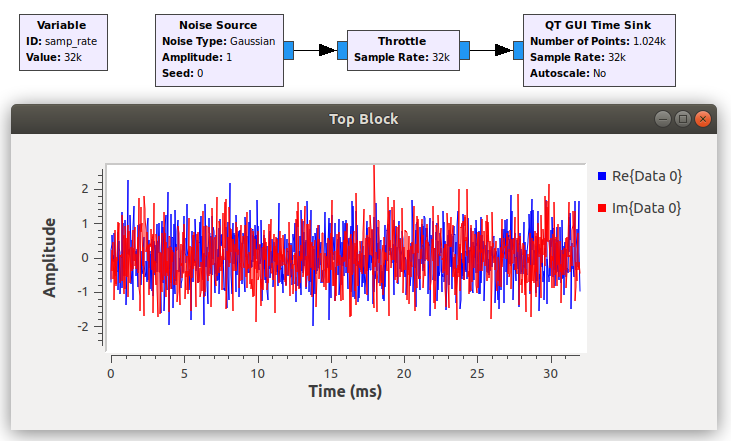Noise Source: Difference between revisions
Jump to navigation
Jump to search
(Fix description of the seed parameter.) |
No edit summary |
||
| Line 18: | Line 18: | ||
[[File:Noise-source-ex.png]] | [[File:Noise-source-ex.png]] | ||
== Source Files == | |||
; C++ files | |||
: [https://github.com/gnuradio/gnuradio/blob/main/gr-analog/lib/noise_source_impl.cc] | |||
; Header files | |||
: [https://github.com/gnuradio/gnuradio/blob/main/gr-analog/lib/noise_source_impl.h] | |||
; Public header files | |||
: [https://github.com/gnuradio/gnuradio/blob/main/gr-analog/include/gnuradio/analog/noise_source.h] | |||
; Block definition | |||
: [https://github.com/gnuradio/gnuradio/blob/main/gr-analog/grc/analog_noise_source_x.block.yml] | |||
Latest revision as of 17:21, 5 March 2024
Produces a "noise" signal using either a Gaussian or Uniform distribution
Supports output of type complex, float, int, or short.
Parameters
- Noise Type
- The random distribution to use, only Gaussian and Uniform are supported
- Amplitude
- The standard deviation of a 1-d noise process. If this is the complex source, this parameter is split among the real and imaginary parts
- Seed
- Seed for random generators. If 0, the seed will be selected using the system clock such that the output sequence is different on each run. Use a non-zero seed to get the same output on each run.
Example Flowgraph
Source Files
- C++ files
- [1]
- Header files
- [2]
- Public header files
- [3]
- Block definition
- [4]
